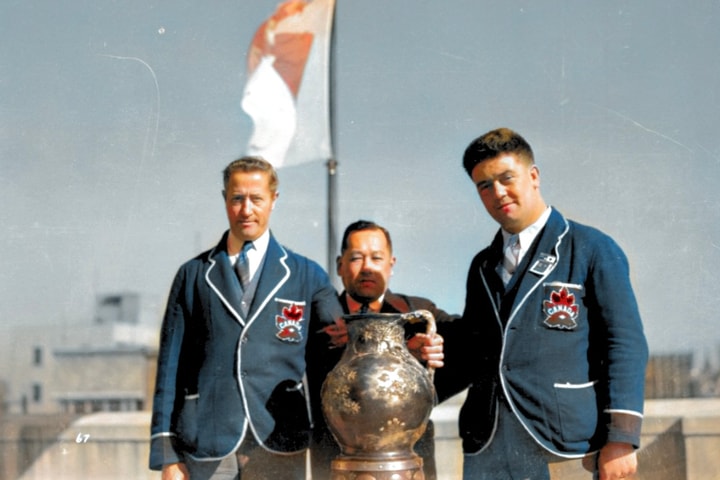
01 November 2025

Last year's Autumn Nations Cup produced some ground-breaking moments. Introduced to cover the gap caused by the Covid pandemic in 2020 which closed sports stadiums for long periods to all but a very few spectators, these matches in the northern hemisphere aroused both interest and controversy among TV viewers and pundits.
There has been a perception for some time that the simplest route to a try may now be to pick a large mobile pack of forwards, with full reserve strength on the bench, and for them to bludgeon their way over the line from scrums or mauls taking place or starting within five to as much as thirty metres from their opponents' try lines. And the coup-de-grace for many of these tries is applied by the hooker at the back of the moving maul. The Springboks showed in the 2019 World Cup Final that the combination of a powerful pack topped up by a quality running backline can be devastatingly effective, but there may have been a further power shift during 2020 towards the forwards.

LONDON, ENGLAND - DECEMBER 06: Luke Cowan-Dickie of England is tackled by Louis Carbonel and Sekou Macalou during the Autumn Nations Cup Final and Quilter International match between England and France at Twickenham Stadium on December 06, 2020 in London, England. A limited number of fans (2000) are welcomed back to stadiums to watch elite sport across England. This was following easing of restrictions on spectators in tiers one and two. (Photo by David Rogers - RFU/The RFU Collection via Getty Images)
Six tries were scored by hookers in the Autumn Nations Cup from 13 matches, with England leading the field with four of those tries. In their opening Nations Cup match against Georgia, Jamie George scored the first hat-trick of tries by a hooker in English rugby history and brought his personal tally to seven tries in 54 matches. His distinguished predecessor, Dylan Hartley, scored just 4 tries in 97 matches. Luke Cowan-Dickie, often replacement hooker in recent internationals, has weighed in with seven tries in his last 15 of 26 appearances including a vital score in the Nations Cup final against France at Twickenham in November 2020. In the 150-year history of English international rugby, their hookers have scored a combined 50 tries between them, but 34 per cent of them have been scored by the last three occupants of the position.
Scotland's hookers have been even more prolific. Although their overall tally of 54 tries since 1871 is only slightly larger to that of England, their record in recent years has been astonishing. Three Scottish hookers have filled their boots with 21 tries since 2017, a 38.9 per cent record of all tries ever scored by their hookers. Stuart McInally has scored a Scottish hooker's record 10 tries in 40 matches, Fraser Brown has scored five tries in 54 matches and George Turner has scored seven tries in 12 matches including a hat-trick in 55 minutes against Canada as a substitute in 2018.
Welsh hookers have never been notable try scorers with only 33 tries registered by their hookers in 740 matches since 1881. Irish hookers have been more prolific with 58 tries since 1875. Keith Wood leads the field with an Irish record 15 tries followed by Rory Best with 12, supported by hooking super-sub Sean Cronin with 6 tries in his 72 matches. But it took Wood 58 caps and Best 124 caps to reach their try tallies, so what is happening and are the England and Scottish coaches ahead of the curve in finding a fool-proof method to outwit opposition defences?

ADELAIDE, AUSTRALIA - OCTOBER 26: Keith Wood of Irealand celebrates their one point win over Argentina during the Rugby World Cup Pool A match between Argentina and Ireland at Adelaide Oval October 26, 2003 in Adelaide, Australia. (Photo by Chris McGrath/Getty Images)
An analysis of tries scored by hookers in recent matches is instructive. Rugby league style defence with players stretched out across the field to prevent break-throughs by opposing set of backs has ensured that a well-controlled rolling maul gives a pack a strong chance of advancing to the try-line while most of the opposition players are fanned out to prevent midfield breaks. By the time these players rush back to support their pack and try to prevent the attack, it is often too late and a try has been conceded. Interestingly, many of these tries require the confirmation of the TMO, but that is a benefit deriving from increased use of modern technology.
The balance of play may have swung decisively towards the forwards over the last couple of years, with consequences for those advocates of open rugby including TV companies who need the game to be exciting with the capacity to attract new viewers . We may need the French, whose hookers have scored a respectable 58 tries in their 772 matches since 1906, to ride to the spectators' and viewers' rescue with scintillating back play over the next few years.
About the Author - A professional musician and arts administrator, Richard Steele has been on the committee of the World Rugby Museum at Twickenham since 2005 and is the co-author of the RFU's 150th anniversary book 'England Rugby 150 Years'.
Follow the World Rugby Museum on Facebook, Twitter and Instagram.